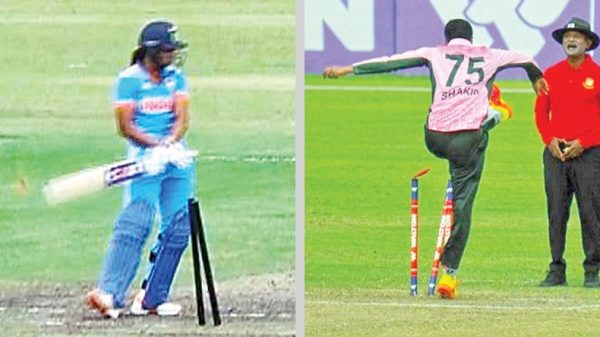Bangladesh umpires back on focus

- Update Time : Thursday, July 27, 2023
- 60 Time View

Harmanpreet Kaur, captain of the Indian women’s cricket team, is being slammed by the cricket world for her actions during the series decider of the three-match ODI series against Bangladesh, but this incident has handed Bangladesh cricket authorities an opportunity to focus back on local umpires.
The India skipper has been suspended for two matches and was fined 75 per cent of her match fee by the game’s apex body, ICC, for her on-field behaviour and verbal jab at umpires in the third one-day international in Mirpur on Saturday, which ended in a thrilling tie, and the two sides had to share the series trophy.
This was not the first time someone slammed a Bangladeshi umpire for ‘questionable’ calls.
Back in 2018, during the Bangladesh men’s team’s three-match home Twenty20 International series against West Indies, where the visitor’s captain Carlos Brathwaite reacted angrily after Tanvir, the same on-field umpire, incorrectly called a no-ball off Oshane Thomas. .
Brathwaite even said that he was willing to risk punishment for objecting and halting play for eight minutes.
These occurrences might seem trivial, but the errors from the local umpires are causing unrest in the international arena from time to time should be a massive wake-up call for them regarding the quality of the country’s umpire.
The lack in their quality has also been reflected upon the position of local umpires in the global arena.
Bangladesh umpires have never had a major international presence, as over the 23 years since Bangladesh got their Test status, no umpire from the country managed to make it into the ICC’s elite panel.
Meanwhile, the ICC international umpires panel is made up of four umpires from each Test-playing nation, and Bangladesh’s representatives on the panel are Sharfuddoula Ibne Shahid Saikat and Mausudur Rahman Mukul, alongside Tanvir and Sohel.
They hardly get called for Bangladesh’s overseas series, series where Bangladesh aren’t playing, or international tournaments.
While Saikat got a chance to officiate in an ICC Women’s World Cup and Mukul and Sohel officiated in an ICC Under-19 World Cup, none of them ever got a call-up to officiate in a Men’s World Cup match, be it a 20-over one or 50-over one.
They mostly get to officiate in bilateral series that take place in the country, and that too because of the ICC’s decision to opt for local umpires to officiate international matches, especially after the pandemic.
While the local umpires have a really weak picture in the international arena, the scenario isn’t any better in the country’s domestic arena as well.
Errors and controversial decisions are a regular thing in the country’s domestic leagues, like the Dhaka Premier League, National Cricket League, etc.
Domestic league players keep complaining about the incompetent, substandard, and erroneous umpiring from time to time, it came to the attention of most of the cricket followers in the country when Bangladesh T20I skipper and star all-rounder Shakib Al Hasan caused a massive scene during a DPL match between Mohammedan Sporting Club and Abahani Limited in 2021.
Shakib, who was captaining Mohammedan, kicked and broke the stumps after umpire Imran Parvez denied an LBW appeal to show his dissent, and uprooted the stumps afterwards when the umpires suspended the match due to rain.
Even though Shakib’s behaviour was criticised and penalised back then, it brought the frequent atrocious umpiring decisions taken by the local umpires into question again.
However, BCB didn’t seem to take the matter seriously and facilitate enough training or opportunities to improve the quality of local umpires and put an end to the poor state of local umpires.
So, it’s high time BCB made proper arrangements to train enough qualified umpires who will be able to officiate games capably and competently in both the international and domestic arenas.
Proper umpiring helps a match keep on with its flow and helps the players hold attention to their game, which seems to be largely missing in domestic matches, and after recent events, in some international games as well.
The training for umpires in the country seems little to nonexistent at this moment, considering their position in the global perspective and the error-prone decisions they make from time to time, which should give a massive headache to BCB.
Unless BCB takes some measures to facilitate proper training to bring out more qualified umpires that will officiate games without being erroneous, this kind of feud might keep popping up from time to time, tarnishing the image of the country’s cricket, and it will also be a distant dream for the country’s umpires to reach the elite panel of ICC.















